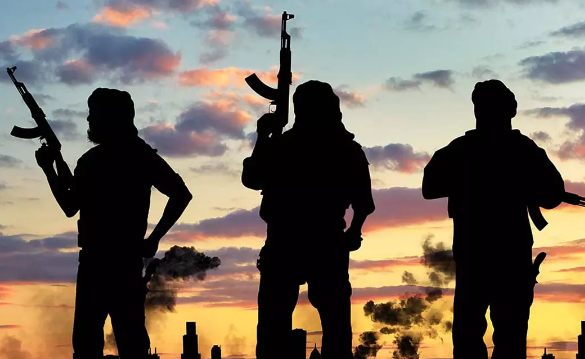Foreign
Zimbabwe approves mass slaughter of elephants to feed hungry citizens

Zimbabwe has authorized a mass slaughter of elephants to feed citizens left hungry by its worst drought in decades.
With nearly half of the country’s population facing the risk of acute hunger, “we are targeting to cull 200 elephants,” Tinashe Farawo, a spokesperson for the Zimbabwe Parks and Wildlife Authority, told CNN on Monday.
The move follows a decision in Namibia to cull elephants and other wild animals to relieve food insecurity fueled by a prolonged drought. The culls have drawn criticism from animal rights activists and conservationists.
Zimbabwe is home to more than 84,000 elephants, Farawo said, around double its “capacity of 45,000,” he added.
2019/11/29: African elephants (Loxodonta africana) in the Huanib River Valley in northern Damaraland and Kaokoland, Namibia.
Zimbabwe’s elephant population is the second-largest in the world, exceeded only by Botswana’s.
Environment Minister Sithembiso Nyoni told parliamentarians last week that “Zimbabwe has more elephants than we need and more elephants than our forests can accommodate.”
She added that overpopulation by elephants “causes lack of resources” for their sustenance, which fuels human-wildlife conflict in the country.
“We are discussing with Zim Parks (Zimbabwe Parks and Wildlife Authority) and some communities to do like what Namibia has done so that we can count the elephants, mobilize the women to maybe dry the meat and package it to ensure that it gets to some communities that need the protein,” Nyoni said.
“When there is an overpopulation of wildlife in a specific park, they will then seek to go outside the park to look for other resources such as water or greenery. When that happens, they will then come into contact with the humans and conflicts begin.”
In Namibia, 700 wild animals, including elephants, were approved for slaughter last month and for their meat to be distributed to people facing food insecurity.
More than 150 animals have already been killed, Namibia’s Ministry of Environment, Forestry and Tourism said, with more than 125,000 pounds of meat shared out.
Zimbabwe and Namibia are just two of the many countries across southern Africa suffering a severe drought caused by El Niño — a natural climate pattern that has resulted in very little rainfall in the region since the start of the year. The countries are also vulnerable to droughts worsened by climate change.
Farawo, the parks spokesperson, told CNN that the culling will begin once the authority completes the necessary paperwork.
“We are doing the paperwork … so that we can start as soon as possible,” he said, adding that the planned slaughter would target areas with a large elephant population.
The proposed elephant culls in Zimbabwe and Namibia have been strongly criticized.
“Culling of elephants must be stopped,” Farai Maguwu, who leads the Zimbabwe-based advocacy group the Center for Natural Resource Governance, said in a post on X.
“Elephants have a right to exist,” he wrote, adding that “future generations have a right to see elephants in their natural habitat.”
Conservation biologist and natural resources consultant Keith Lindsay also expressed his discomfort at using wildlife to alleviate food insecurity, telling CNN that it is “very likely to lead to a more regular, ongoing demand for bushmeat that would be unsustainable.”
Farawo, however, said Zimbabwe’s decision to slaughter elephants — its first cull since 1988 — was part of wider measures to reduce conflict between elephants and humans, following a series of elephant attacks on humans.
“The animals are causing a lot of havoc in communities, killing people. Last week, we lost a woman in the northern part of the country who was killed by an elephant. The previous week, the same thing happened. So it (the culling) is also a way of controlling,” he said.
At least 31 people have died in Zimbabwe this year as a result of conflict between humans and wildlife, local media reported.
Credit/CNN
Foreign
Ukraine Accuses Russia Of Launching 2800 Aerial Bombs, Over 1400 Drones In 14 Days

Ukrainian President, Volodymyr Zelensky, has accused Russia of ongoing hostilities, stating that since the beginning of April, Russia has launched nearly 2,800 aerial bombs, over 1,400 Shahed drones, and approximately 60 missiles at Ukraine.
Zelensky’s statement, released on Monday, reads, “Currently, 38 people are receiving treatment inmedical facilities in Sumy following yesterday’s Russian ballistic strike — among them, 9 children. Eleven people, including 3 children, are in critical condition.”
“Every effort is being made to provide them with maximum assistance. Yesterday’s strike alone claimed 34 lives and left 119 people injured. Tragically, 2 children were killed, and another 15 were wounded.”
“Another 7 people were injured overnight in Odesa during a ‘Shahed’ drone attack. Last night, the Russians also struck Slovyansk, Uman, Kharkiv, Beryslav, and other cities and villages.”
“All the damaged sites are civilian: apartment buildings, stores, a car service station.”
“I thank all the services and everyone involved in rescuing people and defending lives. Russian terror continues every day and night. Since the beginning of April alone, the Russian army has used nearly 2800 aerial bombs, over 1400 attack drones — most of them ‘Shaheds’ — and nearly 60 missiles of various types, including ballistic ones.”
“Only real pressure on Russia can stop this. Tangible sanctions are needed against the sectors that finance Russia’s killing machine. The one who brought the war must be stopped and held accountable for what they have done; that is only fair,” Zelensky said.
In an earlier statement yesterday, Zelensky urged the world not to remain silent in the face of Russia’s continued aggression against Ukraine: “As of now, 31 people are known to have been killed in Sumy by the Russian ballistic missile strike. Among those killed were two children. My condolences to the families and loved ones… More than 84 people have been wounded, including 10 children. All of them are receiving the necessary assistance.”
“It is crucial that the world does not stay silent or indifferent. Russian strikes deserve nothing but condemnation. There must be pressure on Russia to end the war and guarantee security for people. Without truly strong pressure, without sufficient support for Ukraine, Russia will continue dragging this war out.”
Zelensky also accused Russia of rejecting a potential peace opportunity involving U.S. President Donald Trump.
“It’s now the second month that Putin has been ignoring the U.S. proposal for a full and unconditional ceasefire. Unfortunately, there in Moscow they are convinced they can keep killing with impunity. Action is needed to change this situation.”
World leaders have condemned the latest wave of Russian attacks and pledged solidarity with Ukraine.
On Saturday, top diplomats from Russia and Ukraine traded accusations over breaches of a tentative ceasefire agreement brokered by the United States. The deal aimed to halt attacks on critical energy infrastructure, signaling an attempt to ease tensions in the third year of the war.
However, Sunday’s strike underscored the fragility of such negotiations and the continued toll on Ukrainian civilians.
The war, which began with Russia’s full-scale invasion in February 2022, has resulted in tens of thousands of deaths and millions displaced, with no comprehensive peace agreement in sight.
International observers have raised concerns that the missile strike may constitute a violation of international humanitarian law.
Sumy, located near Ukraine’s northeastern border with Russia, has faced repeated assaults since the war began but had seen a relative lull in recent months. Sunday’s bombing marks one of the deadliest strikes in the region in over a year.
Ukrainian officials have called on allies to increase military aid and intensify sanctions on Russia, warning that continued attacks on civilian areas threaten any hope for a negotiated resolution to the war.
Foreign
US orders 30-day registration for all foreign nationals or face jail, deportation

By Francesca Hangeior
The United States Department of Homeland Security (DHS) has announced a new rule requiring all foreign nationals who stay in the country for more than 30 days to register with the federal government.
The directive, introduced this week, is one of the strictest immigration measures in recent years.
In a post titled “Message to Illegal Aliens” and tagged to President Donald Trump and Homeland Security Secretary Kristi Noem, the agency stated,
“Foreign nationals present in the U.S. longer than 30 days must register with the federal government. Failure to comply is a crime punishable by fines and imprisonment. @POTUS Trump and @Sec_Noem have a clear message to Illegal aliens: LEAVE NOW and self-deport.”
Foreign nationals present in the U.S. longer than 30 days must register with the federal government. Failure to comply is a crime punishable by fines and imprisonment. @POTUS Trump and @Sec_Noem have a clear message to Illegal aliens: LEAVE NOW and self-deport. pic.twitter.com/FrsAQtUA7H
Non-compliance could lead to daily fines of $998, heavier penalties for those who promise to leave but don’t, imprisonment, and permanent bans from re-entry.
DHS warned that delaying registration will increase penalties and reduce the chances of returning legally.
“The longer you wait, the higher the penalty, and the slimmer your chances of returning,” the department said.
The agency also introduced a “safe exit” provision for undocumented individuals who choose to leave voluntarily.
Those who self-deport may be allowed to select their departure flight, keep their earnings if they haven’t committed any crimes, apply for subsidized travel if they can’t afford it, and stay eligible for future immigration pathways.
While the rule doesn’t currently apply to individuals on valid visas like H-1B or F-1, DHS emphasized that once a visa becomes invalid—due to expiration, job loss, or program termination—the individual is considered “unlawfully present” and subject to the same penalties.
Maintaining legal status, the agency noted, is more critical than ever.
Foreign
Swiss woman abducted in Niger Republic

By Francesca Hangeior
A Swiss citizen has been kidnapped in Niger, Switzerland’s foreign ministry told AFP, confirming information published by a Nigerien media outlet.
The foreign ministry said it had been “informed of the kidnapping of a Swiss citizen in Niger.
“The Swiss diplomatic mission in Niamey is in contact with the local authorities. Clarifications are under way.”
The governor of the Nigerien state of Agadez, General Ibra Boulama Issa, said the abduction happened in Agadez city, where an Austrian woman was kidnapped three months ago.
The general said “a foreign woman… of Swiss nationality” had been taken from her home there late Sunday.
In a statement, he also referenced the January 11 kidnapping of the Austrian.
-

 News10 hours ago
News10 hours agoSHOCKING! One month after giving birth, woman discovers another baby in her womb
-

 News10 hours ago
News10 hours agoTears, anguish as Plateau Community buries 51 killed by bandits
-

 News10 hours ago
News10 hours agoAngry investors raid CBEX office, loot assets in Ibadan after digital Platform crash
-

 News16 hours ago
News16 hours agoPeter Obi speaks as Benue govt. blocks humanitarian visit
-

 News8 hours ago
News8 hours agoCBEX: 60 fraudulent Ponzi scheme operators to avoid in Nigeria
-

 News17 hours ago
News17 hours agoFUOYE VC suspended over sexual harassment allegations
-

 Politics10 hours ago
Politics10 hours agoIgbo Youths Set To Mobilize 5 Million Man-March In Support Of Tinubu, Kalu
-

 News10 hours ago
News10 hours ago‘Not something I’d wish on anyone’ — Melinda Gates opens up on divorce






